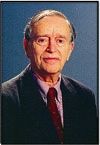
The Passing of Dr. Alan M. Laties
January 10, 2022
Dear Friends and Colleagues,
I am deeply saddened to share that Dr. Alan M. Laties, a cherished friend and beloved physician at Scheie, passed away over the winter holidays at the age of 90, surrounded by his loving family. Dr. Laties had a tremendous impact on the Department, on the field of ophthalmology, and on every one of us.
Dr. Laties attended Harvard College for his bachelor’s degree and Baylor College of Medicine for his medical degree, followed by an internship at Mount Sinai Hospital. He joined Penn in 1961 as one of the first residents during Harold Scheie’s chairmanship. Following residency, he became a USPHS Special Fellow at Penn’s Institute of Neurological Science. Early in his career, Dr. Laties was appointed as the Ophthalmology Department’s Director of Research and helped to develop the department’s academic reputation.
Dr. Laties joined Penn’s faculty in 1964 and was later named the Harold G. Scheie-Nina C. Mackall Research Professor of Ophthalmology. As a neuro-ophthalmologist, Dr. Laties also was a Professor of Neurology at Penn. From 1964-1969, he was awarded a Research to Prevent Blindness professorship, and in 1970, he received the Lindback Award for Excellence in Teaching, a testament to his dedication as a professor.
His prolific research focused on neuro-ophthalmology, particularly on autonomic innervation, eye growth, and therapeutic approaches to retinal degenerations. He authored/co-authored 145 papers and edited two books during his career. In 1972, he was given the prestigious Jonas Friedenwald Award in recognition of his outstanding research. Dr. Laties was the Editor-in-Chief of the journal Investigative Ophthalmology and Visual Research (IOVS) from 1977-1982, and a member of the editorial boards of Retina and Clinical Vision Science. He was awarded the National Retinitis Pigmentosa Foundation Humanitarian Award in 1978 and the Paul Kayser International Award of Merit in Retinal Research in 1992. His numerous research awards also include the New York Association
for the Blind’s Lighthouse Pisart Vision Award, the Llura Liggett Gund Award, and the Alcon Research Institute’s Vision Research Award.
Dr. Laties was a member of several professional and scientific societies. Internationally, these include: the International Congress of Eye Research, the International Glaucoma Society, the International Pigment Cell Society, the International Retinitis Pigmentosa Association, and the International Society for Pharmacoepidemiology. He was a member of national societies, including: the American Academy of Ophthalmology, the American Association of Anatomists, the American Medical Association, the American Ophthalmological Society, the American Society of Cell Biology, and the Association for Research in Vision and Ophthalmology. Locally, he was part of the College of Physicians of Philadelphia, for which he served as President of the Section on Ophthalmology from 1980 to 1983; the Delaware Valley Ophthalmological Society, and the Philadelphia County Medical Society. Dr. Laties was also part of several academic and institutional committees during his career. His dedication to ophthalmology was clear.
Dr. Laties was an active senior member of the Foundation Fighting Blindness, serving as Foundation’s first Scientific Advisory Board (SAB) chair for 32 years and unofficially as the Foundation’s first chief scientific officer. He was deeply committed to finding treatment for retinal diseases. This commitment was also reflected in his co-founding of MacuSight and Valley Forge Pharmaceuticals, and his participation as a member of the Scientific Advisory Boards of Inotek Pharmaceuticals Corporation, MacuSight, Inc., and Neurotech Pharmaceuticals, Inc.
Dr. Laties’ broad scientific interests and many productive interactions had a lasting impact on his colleagues in vision research at Penn and around the world. Curious and truly excited about scientific ideas, he also cared about the individuals involved in science. He was an ideal mentor and friend to many. His enthusiasm and positive outlook stimulated true and lasting friendships among his colleagues. Dr. Laties posed novel questions and creative hypotheses about the eye. His openness stimulated many basic and translational collaborations among his colleagues. Despite his prominence, he never erected artificial barriers between himself and other scientists but treated all with fairness, respect, and support. He joyously attended to his many relationships with his extended scientific family at ARVO, ISER, Retinal Degeneration, and other meetings. A kind and honorable man, Dr. Laties had an insightful story for every occasion; and his colleagues often shared endearing personal stories about him. He will be missed by many.
As we mourn this tremendous loss, we also celebrate Dr. Laties' incredible life and feel thankful for his long and impactful career at Scheie.
Sincerely,
Dr. Joan M. O’Brien
Please send any questions to isabel.dirosa@pennmedicine.upenn.edu
 Back to Faculty Announcements
Back to Faculty Announcements